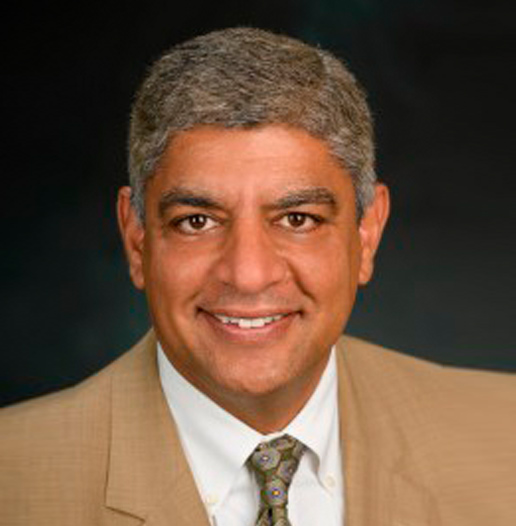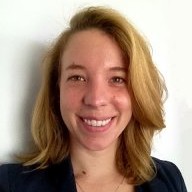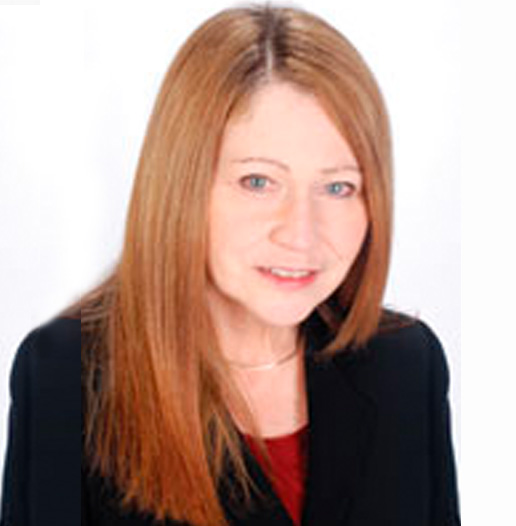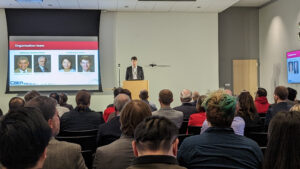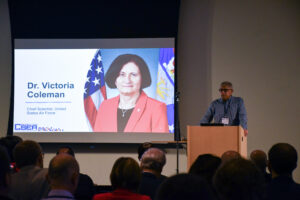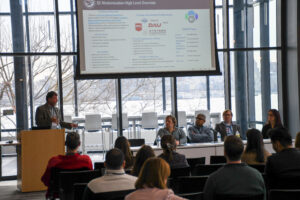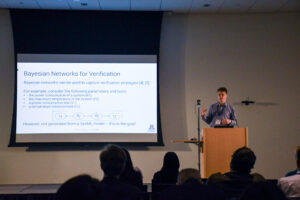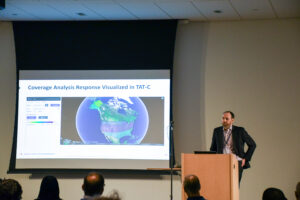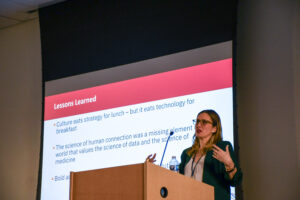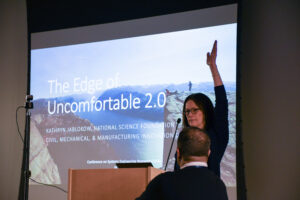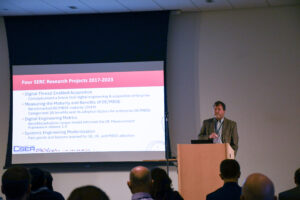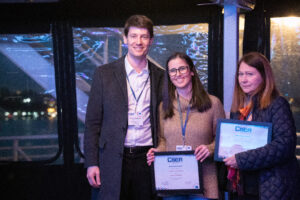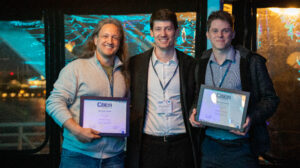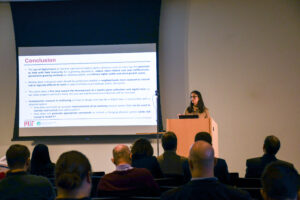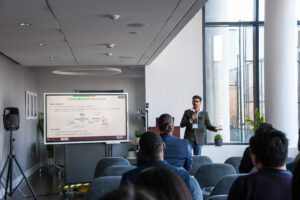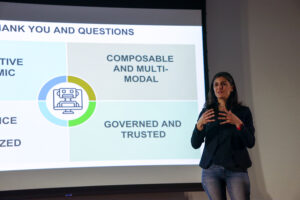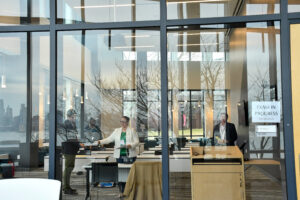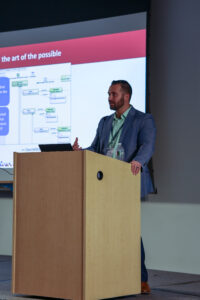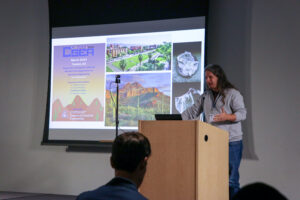At the 20th Conference on Systems Engineering Research (CSER) on March 16-17, several experts from the Systems Engineering Research Center (SERC) contributed papers, served as session chairs, hosted workshops, engaged with new colleagues, and guided discussions that will continue to shape the field.
SERC Executive Director Dr. Dinesh Verma served as an honorary chair with Dr. Azad Madni of the SERC Research Council. When Verma was Dean of the School of Systems and Enterprises at Stevens Institute of Technology, he partnered with Madni and others at the University of Southern California to launch the inaugural CSER in 2003. The conference attracted the Department of Defense (DoD), which was growing interested in applying systems engineering to its priorities. The DoD established the SERC in 2008 as a University Affiliated Research Center, and many of the universities and researchers that attended the early CSER events became part of the SERC network.
“It’s not a coincidence that the SERC is led by Stevens, with USC as its first collaborator,” Verma said. “It was CSER that helped us create awareness within the DoD for the need for research in systems engineering.”
Stevens hosted CSER in 2023 for the seventh time, welcoming attendees from France, Norway, Israel, and across the United States, plus representatives from firms such as MITRE, Deloitte, and Amazon. During the technical program, which included keynotes from five distinguished speakers, SERC experts presented on the SERC research portfolio and other topics.
SERC CTO Tom McDermott hosted a paper session on systems engineering modernization. “Modernization responds to the lack of an integrated approach that is creating inefficiencies and delays,” McDermott said. “We need to get beyond the historical view of systems engineering as a linear process. We are not living that reality anymore but are still visualizing the practice that way. New mental models are needed to move forward.”
Dr. Alejandro Salado of the University of Arizona and his colleague Dr. Joe Gregory earned one of two Best Paper Awards for their research on model-based verification strategies, and another SERC researcher, Dr. Donna Rhodes of Massachusetts Institute of Technology, and her colleague Dr. Joana Cardoso earned the other award for their paper on digital twins.
“On behalf of the CSER technical committee, we are pleased to announce the 2023 Best Paper Awards,” said Dr. Steven Hoffenson, a Stevens professor who chaired the conference with Dr. Lu Xiao. “These papers were selected after a full peer review process, where each was reviewed by at least three members of the systems engineering research community and scored for their quality and relevance.”
Dr. Astrid Layton of Texas A&M University contributed to two papers that addressed a conference theme this year on sustainability. “Sustainable design is a complex problem and addressing it requires consideration of a design within its surroundings using a systems perspective,” Layton said. “Systems engineering is critical for recognizing sustainable solutions and ensuring their success.”
Other SERC experts who contributed papers with various co-authors include Chief Scientist Dr. Dan DeLaurentis on a digital-enabled mission engineering framework; Dr. Peter Beling on product herding for intelligent systems; Dr. Mark Blackburn on an interactive design dashboard for an artillery system; Dr. Daniel Dunbar and Dr. Thomas Hagedorn on graph representation of systems of analysis; Dr. Paul Grogan on system modeling vocabulary; Dr. Bryan Mesmer on measurements in system design; Dr. Roshanak Nilchiani on metric assessments; and Dr. Paul Wach on the digitalization of traditional systems engineering artifacts.
Several of the researchers contributed to multiple papers. Verma collaborated on the paper about digital artifacts, building on SERC research into workforce training. Dr. Jon Wade chaired a paper session on systems engineering reviews. Dr. Carlo Lipizzi led a workshop on natural language processing.
On behalf of the International Council on Systems Engineering (INCOSE), Salado co-hosted the Systems Engineering and Architecting Doctoral Student Network (SEANET) workshop. “SEANET provides an environment where students are exposed to diverse experiences and receive valuable insight for their future careers,” Salado said. “Students participate in roundtables moderated by senior mentors where they can share and discuss any aspect related to their doctoral journey, from finding relevant research questions to designing their research and validation plans.”
Dr. Nicole Hutchison of Stevens Institute of Technology helped administer an exam for INCOSE certification and lead a workshop on applying for academic equivalency. “INCOSE certification is an opportunity to highlight members’ knowledge and experience in systems engineering,” Hutchison said. “The workshop on academic equivalency helps faculty members learn how to apply for the program, which allows students to use their coursework in lieu of taking the knowledge exam. This opens certification to many more students, giving them the opportunity to have a globally recognized credential.”
Planning is underway for the next CSER in March 2024 at the University of Arizona. Verma and Madni will serve again as honorary chairs, and Salado will serve as conference chair. In the meantime, SERC researchers will build on the connections they developed at CSER this year.
“CSER is a unique event because it brings together the whole research community – from the faculty and researchers I often see to the students who do not always get a chance to travel to conferences,” Hutchison said. “At this event alone, I met three students whose research areas align with mine, and we’ve already started corresponding so I can provide review and feedback on their work and learn from them as well. The same can be said for me – I have new contacts interested in the work we’re doing at the SERC and have already started collaborating. I’m looking forward to the next CSER.”

